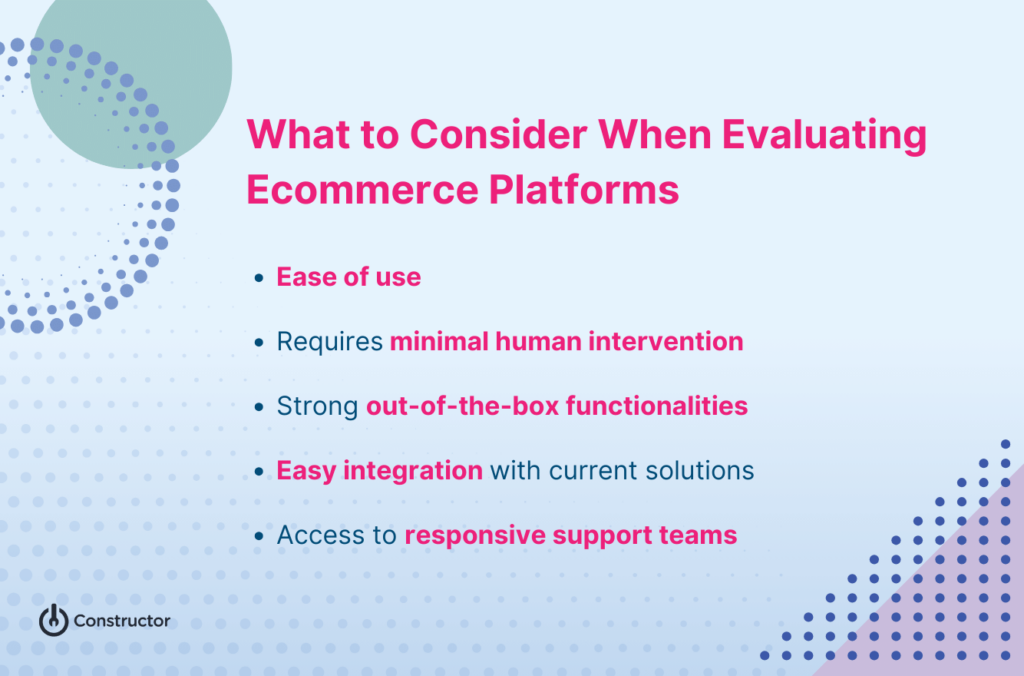Ecommerce retailers today have a lot on their plates. And as many continue with their digital transformation journeys, they find that automating key processes offers many benefits: streamlining operations, boosting efficiency, and improving the customer experience, to name a few.
With many components in the ecommerce tech stack, especially in enterprise ecommerce, there are also many areas where you can effectively introduce automation. To help determine the use cases that may be right for your business, we’ll explore six, high-impact types of ecommerce automation software.
First Things First, Take a MACH Approach
Not all software is created equal. The wrong fit can go as far as introducing headaches, rather than alleviating your load.
For ecommerce companies looking to quickly unlock business value and streamline internal operations with their tech investments, a composable approach often helps, turning the ecommerce tech stack into a competitive advantage.
Breaking free from the more traditional, monolithic platform, composable commerce involves the use of best-of-breed, “building block” software that allows independent systems to communicate via APIs. Because of this structure, composable solutions can be exchanged for other best-of-breed components, as business needs dictate.
Across the below types of ecommerce automation software, many of the vendors are MACH-compliant (Microservices-based, API-first, Cloud-native SaaS, and Headless). This is an important distinction as you consider solutions to improve agility, speed to innovation, and decision-making.
Types of Ecommerce Automation Software
From real-time inventory tracking and email marketing to order fulfillment, product information management, and more, automation exists for every area of enterprise ecommerce operations.
Ecommerce platforms
At a basic level, ecommerce platforms enable B2C and B2B businesses to create, manage, and sell products and services via online stores.
Automation comes into play across many ecommerce platform capabilities and features, often when the platforms have functionality baked in for:
- Inventory management
- Order processing and fulfillment
- Payment processing
- Customer service
- Marketing
- Content management
- Website optimization
- Fraud prevention and detection
- Data analysis and insights
- And more
Note: Many of these capabilities can also be added onto ecommerce platforms with other solutions via a composable approach.
When evaluating platforms, consider the unique needs of your business. If you need a solution that requires minimal human intervention to maintain, opt for those that are AI-driven with strong, out-of-the-box functionalities. It’s also essential to ensure they’re easy to integrate with your current solutions, are proven to drive results for your company’s industry, and provide access to responsive support teams.

Plus, since large ecommerce companies often have more complex needs as they grow and scale, their teams should keep in mind more specific considerations when evaluating platforms.
Some of the best enterprise ecommerce platforms include:
Marketing and sales automation software
Marketing and sales automation software tackles various processes. It uses data and technology to help businesses attract, engage, and convert leads.
There are a wide range of vendors in this space leveraging automation. They include:
- Content management systems, like Amplience and Contentstack, which help you handle your ecommerce content.
- CRMs, such as HubSpot and Salesforce.
- Customer engagement platforms, such as Klaviyo, ActiveCampaign, and Braze.
- Reporting and analytics solutions, like Google Analytics 360 and Adobe Analytics.
- Social media tools that automate post scheduling and analytics, such as Buffer and Hootsuite.
Across this broad category of software solutions, automation is also commonly implemented in areas such as:
- Lead generation, nurturing, and scoring
- Customer segmentation
- Campaign management
- Sales enablement
- And more
Inventory management software
Effective inventory management or automation software such as Netstock, Blue Yonder, and Cin7 help businesses track, manage, and optimize inventory; forecast demand; improve supply chain efficiency; provide better customer service; improve relationships with third-party suppliers; and more.
Relying on outdated systems or ERPs for tasks like the ones above would be way too burdensome, time-consuming, and error-prone. That’s why modern-day inventory management solutions often include AI features and automation to reduce manual intervention.
When evaluating solutions, consider your own challenges and pain points, features offered, the software’s level of automation (In what ways can it improve efficiency and accuracy?), integrations, and scalability.
Product Information Management (PIM) software
PIM solutions, such as Akeneo, “collect, manage, and enrich your product information; create a product catalog; and distribute it to your sales and ecommerce channels.” Product information collected may include descriptions, images, pricing, and more.
You can leverage PIM solutions to automate routine and time-consuming product data-related tasks to increase efficiency. For example, Akeneo uses AI and automation for the following circumstances:
- Collection and cleansing of product data. Their platform identifies and corrects inconsistencies and missing information.
- Content generation and enrichment of product descriptions, titles, and metadata to improve search engine visibility and relevance.
- Localization and globalization, tailoring content and experiences to distinct markets and geographies, while ensuring consistency and accuracy.
Ecommerce fulfillment software
By employing automation, ecommerce fulfillment software can speed up order processing time, better manage inventory, significantly reduce errors, and improve overall delivery experiences.
Automation and AI come into play to address and expedite aspects of a variety of processes:
- Order fulfillment planning
- Stock planning
- Receiving of inventory
- Stock control
- Order shipping
- Return management
- Fulfillment tracking and analysis
- And more
The software typically integrates with ecommerce platforms; procurement, accounting, and shipping software; and business intelligence solutions, among others.
Larger players in the ecommerce fulfillment space include ShipBob, ShipMonk, and ShipHero. Logiwa is another relevant vendor, providing a cloud-native and AI-powered platform for high-volume order fulfillment.
Product search and discovery software
AI-native product search and discovery solutions like Constructor make it easy for buyers to find the items they want, quicker.
Via personalization in tandem with advanced algorithms, transformers, and large language models (LLMs), Constructor automates the delivery of tailored customer experiences and journeys, while simultaneously optimizing for ecommerce-specific KPIs (e.g., revenue, conversions, inventory balancing, high-margin products, etc.).
Among the many areas that Constructor automates are:
- Product rankings in ecommerce search. Many retailers still rely on archaic and keyword-based search engines. With these engines, if someone searches for “green apple” looking for Granny Smiths, they’ll get green-apple scented shampoo and green-apple flavored candy among their search results — simply because “green apple” is part of the product name. In contrast, the best ecommerce search engines leverage AI to analyze user queries, product attributes, and relevance signals like clickstream behavioral data to automatically deliver accurate results that map to buyer intent, history, and preferences. So, if that aforementioned shopper tends to buy organic, then organic Granny Smiths will be prominently displayed — without irrelevant or extraneous products among the results.
- Synonym detection and typo tolerance. Merchandisers often sink hours into fixing synonyms and typos in online search, implementing workarounds and manually boosting and slotting items as needed. Constructor automates this, giving ecommerce teams hours back in their days for more strategic work and enabling buyers to quickly find what they’re looking for.
- Faceted search and filtering. Our AI automatically generates and maintains product facets and filters based on attributes such as category, price range, brand, size, color, availability, and more. This allows buyers to refine search results quickly and get what they need.
- Personalization. Rather than manually create granular, complicated IF → THEN rules for personalization (and inevitably face unraveling those heavily nested rules), AI can do the work for you. Constructor analyzes cross-channel user behavior, preferences, and purchase history to deliver personalized experiences across search results, browse experiences, product recommendations, product-finder quizzes, landing pages, and more
- Dynamic merchandising. Instead of relying on static online displays or trying to manually segment experiences, you can use Constructor’s AI to adjust product rankings and placements based on factors such as popularity, inventory levels, seasonality, and user preferences and engagement. Constructor features the most relevant and in-demand products in search results and category pages.
- Merchant controls and intelligence. AI and machine learning (ML)-driven predictive analytics provide merchandisers with insights into how the decisions they make (e.g., slotting a product at the top of results or boosting up higher-margin products) will affect the site’s metrics as a whole. No need to pour over the data manually.
As you evaluate ecommerce product search and discovery vendors, consider platforms that are based on MACH principles, leverage first-party clickstream data and zero-party data to inform results and experiences, and are ecommerce-first: built from the ground up to handle the demands of ecommerce-specific use cases.
Also, apply scrutiny to vendors’ AI claims. AI-native solutions reap predictive results, require minimal human intervention, and get smarter over time. They’re also more scalable than general-purpose technologies that have AI bolted-on as an afterthought, creating a sort of “Frankensearch” monster.
Deciding on the Best Fit for You
As they create compelling and engaging customer experiences, ecommerce retailers know that one size doesn’t fit all. The same goes for evaluating ecommerce software for business needs: one size doesn’t fit all either. The right product often depends on each company’s unique pain points and requirements.
That’s why, across all these categories of ecommerce automation software, it’s important to ensure selected technology is developed for businesses like yours (size, sector, etc.).
In addition, consider your team’s needs and bandwidth when assessing the role AI plays in these various ecommerce software solutions. The right products will not only streamline and alleviate workloads, but also enable your business to scale more easily, increase resilience, and improve customer interactions.


